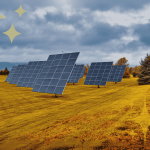Solar energy is a sustainable alternative to traditional energy sources. It is a clean, renewable, and eco-friendly energy source. But those are not the only considerable factors in converting your household power system to a solar power system. Though solar energy has many advantages, it also has some disadvantages, like other energy sources.
This article will help you to explore all the pros and cons of solar energy, through which you can decide to install it in your house. After reading the article, you will be able to determine whether the solar energy installation in your house is the right or wrong decision for you.
Let’s start a deep discussion on the advantages and disadvantages of solar energy.
What is solar energy?
Solar energy is the thermal or electrical energy harnessed from the sun. It is renewable energy that can be used again and again. Solar panels capture the sun’s energy and convert it into electricity.
Solar panels are made of semiconductor materials, most of the time silicon. When sunlight falls on the solar cells, it energizes the electrons to break the bonding and generate free electron flow. These electron flows generate electricity (DC). The DC power is then converted into AC power to power the home appliances.
Pros and Cons of Solar Energy:
| Advantages of Solar Energy | Disadvantages of solar energy |
| Renewable energy sources | High installation costs |
| Lower electricity bills | Expensive energy storage |
| Diverse Application | It doesn’t work for all roof types |
| Low maintenance costs | Panels are dependent on sunlight |
| Technological development | Space constraints |
| Environment friendly | The manufacturing process badly impacts the environment |
| Reduces carbon footprint | Relocation difficulty |
| Create new job opportunities | Materials scarcity |
| Energy independence | Limited recycling options/ Disposal |
| Government incentives | |
| Increase home values | |
| Community Benefits |
Details of the Advantages of Solar Energy
1. Renewable energy source:
Solar is one of the most dependable renewable energy sources. This source of solar energy is infinite and will not be diminished with time like fossil fuels. Besides, it doesn’t release harmful byproducts for the environment.
2. Lower electricity bills:
Solar panel installation can significantly reduce energy bills. You will generate your electricity and reduce your dependence on the grid. This can lead to substantial long-term savings because traditional energy sources cost a lot in recent years.
3. Diverse Application:
Solar energy has diverse applications in different sectors, from residential rooftops to commercial and industrial setups. It can power homes, businesses, and even remote areas that have no access to the electricity grid.
It is also used to energize solar-powered vehicles, charging stations, and portable devices.
4. Low maintenance costs:
A solar power system needs less maintenance than a conventional power system. The interruption percentage of solar energy is very low. Cleaning up the dust and debris is enough to operate the solar power system for many years.
Solar systems thus save huge costs in the long term compared to other energy systems that may require frequent maintenance and part replacements. However, the professional annual servicing charge for the solar panel may cost around $140 to $180, and the annual cleaning and supervising costs are about $150.
5. Technological development:
Solar technologies are rapidly evolving into more efficient solar panels and sustainable energy storage systems. The present panels are more efficient than the early solar panels. The continuous progress of solar panels is increasing the affordability and accessibility of solar power systems.
2. Environmentally Friendly:
Solar energy is the most environmentally friendly energy source. It produces clean and renewable power from the sun’s rays. Besides, it has no byproducts like fossil fuels. Hence, solar energy does not pollute the air and has no greenhouse gas emissions.
Individuals and businesses can minimize their carbon footprint by using solar power.
2. Create New Job Opportunities:
The solar sector is the most rapidly growing field in the world. It is creating many job opportunities every year in different sectors. The installation, maintenance, and manufacturing of solar panels require skilled workers, leading to employment opportunities in the engineering, construction, and technology sectors.
The demand for solar energy is increasing every year, so the need for professional personnel also increases. This job opportunity boosts the economy and employs a dedicated workforce to create sustainable energy solutions.
2. Energy Independence:
Solar energy will give you independence in power generation and consumption. This means you will not always be dependent on the power grid for the power supply to your house. It reduces fossil fuel consumption, energy bills, and power cuts.
2. Govermernt Incentives:
Government incentives are very helpful to promote the adoption of solar power. These incentives can include tax credits, rebates, grants, and feed-in tariffs. These initiatives effectively reduce the cost of installing and maintaining solar panels for homeowners and businesses.
Government support can make solar energy attractive to individuals and organizations.
2. Increase Home Values:
When you install a solar power system in your house, it will automatically increase the value of your property. The National Renewable Energy Laboratory has shown that one dollar saved in energy bills by solar power increases the property value by $20.
A home with a solar power system is more appealing to the customer. The sale price of a house with solar power may rise by up to 4 percent compared to a house without a solar power system.
2. Community Benefits:
The net metering system of the solar power system will allow you to supply the surplus energy to the grid. It will reduce your energy bills and contribute to the community’s decrease in fossil fuel use.
Disadvantages of Solar Energy:
1. High Installation Costs:
The initial installment costs of solar energy are the main barrier to its use. The cost of solar panels, inverters, batteries, and other components is a burden for homeowners and businesses.
2. Expensive Energy Storage:
You need to install a reliable battery system to store surplus solar energy for use at night and during cloudy periods.
The lithium-ion batteries are efficient and advanced for storing electric energy. However, it is still expensive and will increase the overall cost of your setup. Besides, lithium-ion batteries are shorter in their lifespan and have safety issues, temperature sensitivity, and environmental impacts.
2. Doesn’t Work for Every Roof Type:
Solar panels will provide you with the maximum energy when you install them on the rooftop. However, all the roof types are not suitable for solar panel installation. Some factors, like the roof’s orientation, shading, material, and age, impact the feasibility and efficiency of solar panels.
You may need to require some modifications or supports for your roofs to install solar panels, which will increase costs and complications.
2. Panels are dependent on sunlight.
Solar panels rely on sunlight to generate electricity. The generation of electricity can be significantly impacted by weather conditions such as cloudy skies, rain, or snow.
Solar panels may produce less electricity during periods of limited sunlight and inconsistent weather patterns.
Additionally, solar panels cannot generate any electric power at night. So you must install an alternative energy source or battery to get continuous power at night.
2. Space Constraints:
Solar panel installations require a huge amount of space to generate ample electricity. Your rooftops may not have enough space for panel placement. It restricts the system’s capacity and potential energy output.
The alternative is ground-mounted solar systems, which need dedicated land space. This may not be possible for all homeowners or businesses due to space limitations or land use restrictions.
2. Manufacturing Process Badly Impacts the Environment:
Solar panel production needs an energy-intensive process and chemicals. This process harms the environment. The raw material processing and extraction might pollute the environment and generate greenhouse gas emissions.
Moreover, the manufacturing of solar panels requires energy, which may come from non-renewable sources. Proper waste management and recycling practices are essential to mitigating the environmental impact of solar panel manufacturing.
2. Relocation Difficulty:
Relocating solar panels is challenging. Though most of the solar panels are durable and long-lasting, they can be challenging to relocate once installed.
If you decide to move to a new home or location, removing and reinstalling solar panels can be a complex and costly process. It may involve dismantling the system, transporting the panels, and reconfiguring the setup. This is an inconvenience and an unwanted expense for homeowners who will need potential relocations in the future.
2. Materials Scarcity:
The raw materials for solar panels are not available enough and have limited reserves.
For example, the production of silicon-based solar cells requires high-purity silicon derived from quartz. There is a potential risk of scarcity or price volatility for these essential materials with the rising demand for solar panels. This could impact the production capacity and cost of solar panels.
2. Limited Recycling Options/Disposal:
Solar panels have a long lifespan of around 25–30 years. However, proper disposal and recycling of solar panels is challenging. The materials used in solar panel construction, such as silicon, glass, and metals, require specialized recycling processes that may not be widely available.
As a result, many discarded solar panels end up in landfills, contributing to electronic waste and potential environmental hazards. The lack of comprehensive recycling programs and infrastructure for solar panels is a growing concern for the sustainable disposal of these devices at the end of their life cycle.
The above description was to answer the question of what the pros and cons of solar power are. I think you get all the results on what are solar energy’s advantages and disadvantages. If you still have any questions about solar panels, leave a comment in the comment section of our blog. We will come back with a solution.



